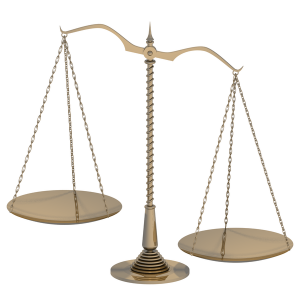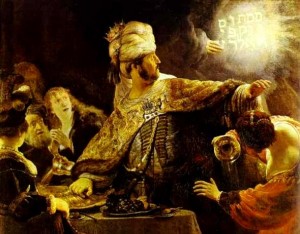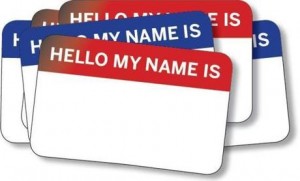From the Book of Daniel:
Daniel answered in the presence of the king, “You have exalted yourself against the Lord of heaven! The vessels of his temple have been brought in before you, and you and your lords, your wives and your concubines have been drinking wine from them. You have praised the gods of silver and gold, of bronze, iron, wood, and stone, which do not see or hear or know; but the God in whose power is your very breath, and to whom belong all your ways, you have not honored. So from his presence the hand was sent and this writing was inscribed. And this is the writing that was inscribed: mene, mene, tekel, and parsin. This is the interpretation of the matter: mene, God has numbered the days of your kingdom and brought it to an end; tekel, you have been weighed on the scales and found wanting; peres, your kingdom is divided and given to the Medes and Persians.”
(From the Daily Office Lectionary – Daniel 5:17,23-28 (NRSV) – April 18, 2013.)
 Mene, mene, tekel, upharsin. (KJV)
Mene, mene, tekel, upharsin. (KJV)
“Your days are numbered. You have been judged and found wanting. Your possessions will be divided among others.” The writing on the wall is a harsh judgment and a decree of the sentence. As it turns out, the judgment is swiftly executed: “That very night Belshazzar, the Chaldean king, was killed. And Darius the Mede received the kingdom, being about sixty-two years old.” (vv. 30-31)
I read these lessons a few days ahead of time so that they can rumble around my head and I can figure out what I want to write about them. I had thought I would be writing something else – indeed, I thought I would be writing about a different lesson . . . . but yesterday the United States Senate voted 54-46 in favor of a bill that would have expand the federal background check system on gun purchases to include sales made at gun shows or over the internet. A majority of senators voted in favor of this legislation, and yet it will not become law. An overwhelming majority of American citizens favor this legislation (by some reports 90%), and yet it will not become law. It would not impose any burden on gun sellers or gun purchasers that is not now required in most gun transactions, and yet it will not become law.
“You have been weighed on the sales and found wanting.” I keep imagining a set of scales like those carried by Lady Justice. On one side of the scales stand 54 senators; on the other, 46. And yet the scales tip toward the 46, toward what should be the lighter side. On one side of the scales stand 90% of the American people; on the other, 10%. And yet the scales tip toward the 10%, toward what should be the light side.
On one side of the scales are the lives of 21 children and six adults killed at Newtown, twelve killed at Aurora, seven killed at Oak Creek, six killed in Tucson, nearly 3,500 people killed by guns since the Newtown massacre; on the other . . . . the interests of the N.R.A. and the gun industry. We know to which side the scales have been tipped.
We have been weighed on the scales. Have we been found wanting? I, for one, believe we have. We have to do something to change this unbalance. We have to do it soon.
Mene, mene, tekel, upharsin.
====================
A request to my readers: I’m trying to build the readership of this blog and I’d very much appreciate your help in doing so. If you find something here that is of value, please share it with others. If you are on Facebook, “like” the posts on your page so others can see them. If you are following me on Twitter, please “retweet” the notices of these meditations. If you have a blog of your own, please include mine in your links (a favor I will gladly reciprocate). Many thanks!
====================
Father Funston is the rector of St. Paul’s Episcopal Church, Medina, Ohio.
 Many are familiar with the phrase “the writing on the wall,” but few know that it has a biblical origin. Here, today, is the beginning of the story from which it comes. Belshazaar, son of Nebuchadnezzar, has thrown a party. He orders booty from the Jerusalem Temple, sacred vessels of silver and gold, used as drinking vessels. While he and his friends are partying, the hand appears as related above and writes on the wall.
Many are familiar with the phrase “the writing on the wall,” but few know that it has a biblical origin. Here, today, is the beginning of the story from which it comes. Belshazaar, son of Nebuchadnezzar, has thrown a party. He orders booty from the Jerusalem Temple, sacred vessels of silver and gold, used as drinking vessels. While he and his friends are partying, the hand appears as related above and writes on the wall. This renaming of Daniel by King Nebuchadnezzar intrigues me. Earlier in chapter 4, Nebuchadnezzar explains that Daniel “was named Belteshazzar after the name of my god” apparently because the king believed Daniel to be “endowed with a spirit of the holy gods.” (v. 8)
This renaming of Daniel by King Nebuchadnezzar intrigues me. Earlier in chapter 4, Nebuchadnezzar explains that Daniel “was named Belteshazzar after the name of my god” apparently because the king believed Daniel to be “endowed with a spirit of the holy gods.” (v. 8)

